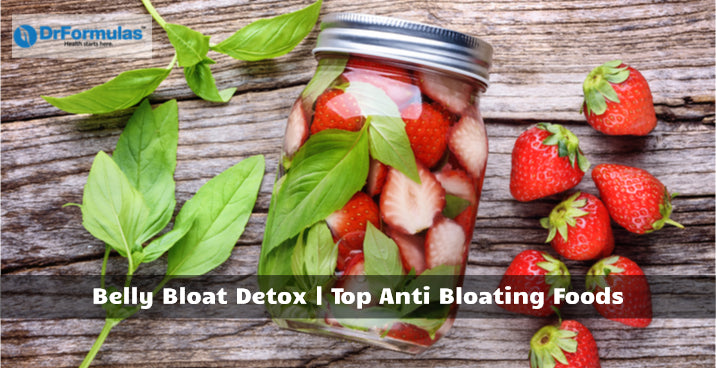7 Detox Waters for Anti Bloating
1. Strawberry and basil
2. Grapefruit and thyme
3. Ginger and lemon
4. Lime and cucumber
5. Watermelon and mint
6. Pineapple and orange
7. Apple and cinnamon
What Causes Gas and Bloating?
To understand how natural remedies for gas, bloating or flatulence work you must first understand how these problems develop first.
Digestion is the process of breaking down large chunks of food into its molecular components. It starts with mechanical chewing of food particles into smaller pieces, continues with mechanical and chemical digestion with acid in the stomach. Enzymes are the key molecular powerhouses which break down molecules into smaller pieces so they can be absorbed into the cells of your digestive tract. There are enzymes released by the salivary glands of the mouth, lining of the stomach, and the first part of the small intestine.
Lacking digestive enzymes will cause you to feel gassy and bloated because anything that is not digested and absorbed will end up being consumed by the bacteria in your gut. These organisms then digest these undigested foods, producing gas and cause you to feel bloated. One example of this happening is if you are lactose intolerant.
How to Get Rid of Gas and Bloating
Let's talk about home remedies for gas and bloating.
Digestive Enzymes
One is to supplement the body with enzymes. As discussed earlier, enzymes break down food and prevent undigested and unabsorbed food from reaching gut bacteria that turn the undigested food into gas. This is how the over-the-counter supplements Lactaid and Beano work. Lactaid contains lactase which breaks down lactose in dairy products while Beano contains amylase, the enzyme that breaks down starches. DrFormulas’ Digestive Enzymes contains 18 different enzymes including proteases 1 and 2, aspergillopepsin, amylase, lipase, cellulose, glucoamylase, invertase, alpha galactosidase, beta glucanase, pectinase, xylanase, phytase, hemicellulose, lactase, bromelain, papain, and peptidase.
Foods Rich in Enzymes
You can also consume foods that are rich in enzymes. Here is a list of foods that contain enzymes. The enzymes contained in these foods will not be as potent as digestive enzyme pills.
- Papayas - Papain is an enzyme found in papayas that breaks down proteins.
- Pineapple – Bromelain is found in pineapples is another protein breaking enzyme and is.[1]
- Whole grains - Amylase enzymes are produced by the pancreas and salivary glands in the mouth. Amylase can also be found in whole grains such as barley.[2]
- Oats - Lipases are enzymes that break down fats. A good source is oats.[3]

Probiotics for Gas and Bloating
Probiotics may also be helpful for gas. As mentioned earlier the gut is teeming with bacteria. Each one has a different way of utilizing the food that you eat. One type of probiotic is lactobacillus. This particular probiotic organism takes lactose and turns it into lactic acid. Digestion of lactose by this probiotic produces less gas than via digestion by other gut microorganisms. One solution to gas and bloating is to shift the balance of gut bacteria to ones that produce less gas and bloating.
Good sources of probiotics include[4]:
- yogurt
- kefir
- miso
- kimchi
- sauerkraut
- tempeh
- kombucha
- natto
Be advised that probiotic rich foods rich in fiber can cause increased flatulence in susceptible individuals so you will have to experiment and see which probiotic rich foods will be helpful for reducing gas and bloating in your body. This is not due to the probiotics themselves but the fiber content of some of the foods such as kimchi. [5]
Consuming probiotic supplements may work better for some people than consuming probiotic rich foods. These pills contain concentrated probiotic organisms without the food that can sometimes cause gas. One study comparing supplementation of placebo pills with probiotic pills consisting of Lactobacillus plantarum found that Lactobacillus plantarum reduced flatulence.[6] Nexabiotic Probiotics from DrFormulas contains 23 different probiotic organisms including Lactobacillus plantarum.
Avoid Foods that Cause Gas and Bloating
1. Dairy
Being lactose intolerant means that your body does not produce enough of the enzyme lactase to break down the lactose you ingest. Lactose is actually a molecule made up of two sugar molecules called glucose and galactose that are linked together. The enzyme lactase is able to break the link between these two sugar molecules so that your body can absorb the individual building blocks into the cells lining the gastrointestinal tract. Without the lactase enzyme to break down the larger lactose molecule, the larger lactose molecule does not get absorbed and passes to the lower digestive tract, the large intestine where bacteria start to break it down for their own use. Once this happens they release carbon dioxide gas, methane, hydrogen sulfide, and other gasses that produce the unpleasant feeling of bloating.
2. Beans
You may have heard that beans cause you to have gas. It is not a myth. The reason why beans cause bloating and gas is because beans contain a compound that inhibits the enzyme amylase. Amylase breaks down starch which are very long chains of sugars. Without amylase these long food chains end up in the gut where they are devoured by bacteria, producing gas.
3. Lentils
4. Carbonated Drinks
5. Cruciferous Vegetables
6. Onions
7. Barley and Rye
8. Apples
9. Garlic
10. Beer
11. Sugar Alcohols
In summary, to reduce gas and bloating you can address the root of the problem by supplementing your body with enzymes. The best source of enzymes are over-the-counter supplements because they are more potent than enzyme-rich foods. You can also take probiotics to try to shift your gut bacteria towards organisms that produce less gas. There are also foods rich in probiotics.
Sources
[1] http://healthyeating.sfgate.com/foods-containing-protease-10348.html
[2] https://en.wikipedia.org/wiki/Amylase#Fermentation
[3] https://www.ncbi.nlm.nih.gov/pubmed/7865271
[4] http://www.webmd.com/digestive-disorders/ss/slideshow-probiotics
[5] https://www.organicfacts.net/health-benefits/other/health-benefits-of-kimchi.html
[6] https://www.ncbi.nlm.nih.gov/pubmed?term=10811333



